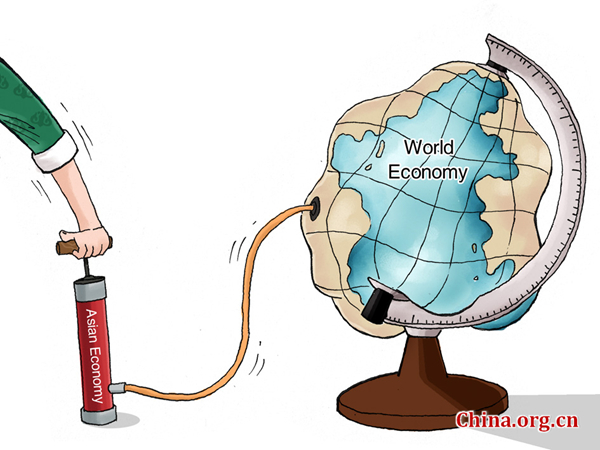The AIIB: making room for China in the global economy
- By Zhang Lijuan
 0 Comment(s)
0 Comment(s) Print
Print E-mail China.org.cn, April 20, 2015
E-mail China.org.cn, April 20, 2015
|
|
|
The pump [By Zhai Haijun/China.org.cn] |
A Chinese proverb says, "If you want to get rich, build a road first." This is a fair way of representing China's 30 years of economic development: invest in infrastructure by building roads and railroads to power GDP growth. As a learning and developing economy, China has learned firsthand that investment in infrastructure can play a key role for the developing world.
Very few "China model" experiences can be applied to other nations, but infrastructure investment is an exception. The reason for this is that almost all developing nations now face the common challenge of outdated infrastructure combined with insufficient funding. Fortunately, as a "rich" nation, China is able to offer help.
Of course, China is not that rich. But as an emerging economy, China has expressed its strong interests in supporting reforms of the U.S.-led World Bank and the EU-led International Monetary Fund (IMF). However, because the U.S. Congress has blocked such reforms, there is little else China can do to promote the financial capability and accountability of these two current international financial institutions.
The future of global development requires economic growth within the developing world. As the developing world is growing stronger, it also deserves more attention, a bigger voice and more decision-making power with respect to international institutions. The current global financial regime is disappointing in several ways. As the second largest economy, China has made the best of the second best by creating the Asian Infrastructure Investment Bank (AIIB).
Right after its initial launch, the AIIB quickly became a welcoming financial institution, particularly to Southeast Asian nations. From a regional perspective, China needs Asia and Asia needs China. For economic and strategic reasons, China and the United States are the two most important strategic and trading partners for all Asian economies. The Asian consensus is that a sound Sino-U.S. relationship will benefit all.
As we all know, Asia is becoming the most dynamic region in the 21st century global economy. But this dynamic can only continue if development bottlenecks are resolved. Without overcoming bottlenecks such as infrastructure investment, Asia cannot sustain its economic growth. This is why China developed and implemented the idea of the AIIB. The AIIB is a unique financial institution and it will provide new financing opportunities for those who need infrastructure investment funding.
To some in China, the AIIB is also a learning experience for China, as China's role will most certainly be enhanced in global governance and rule making. Eventually China's experience with the AIIB, good or bad, will help China grow into a global player on behalf of the developing world. The AIIB could serve as a valuable learning opportunity for China to better understand the world financial regime itself and how to manage it.






